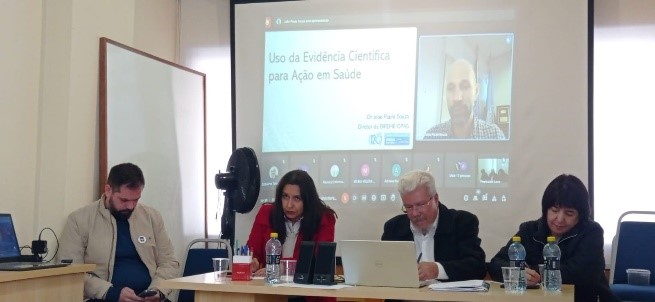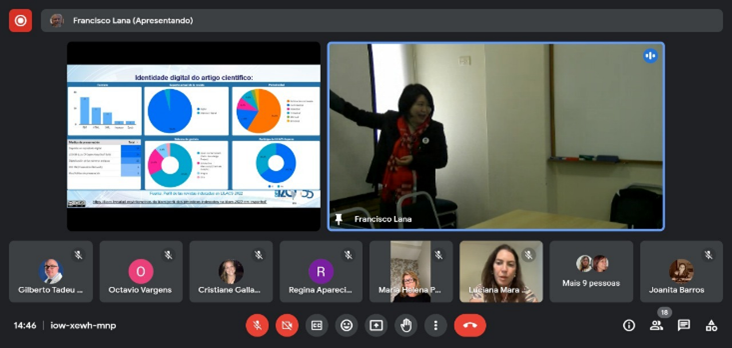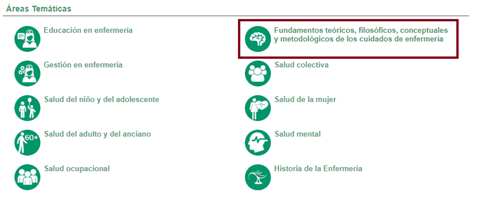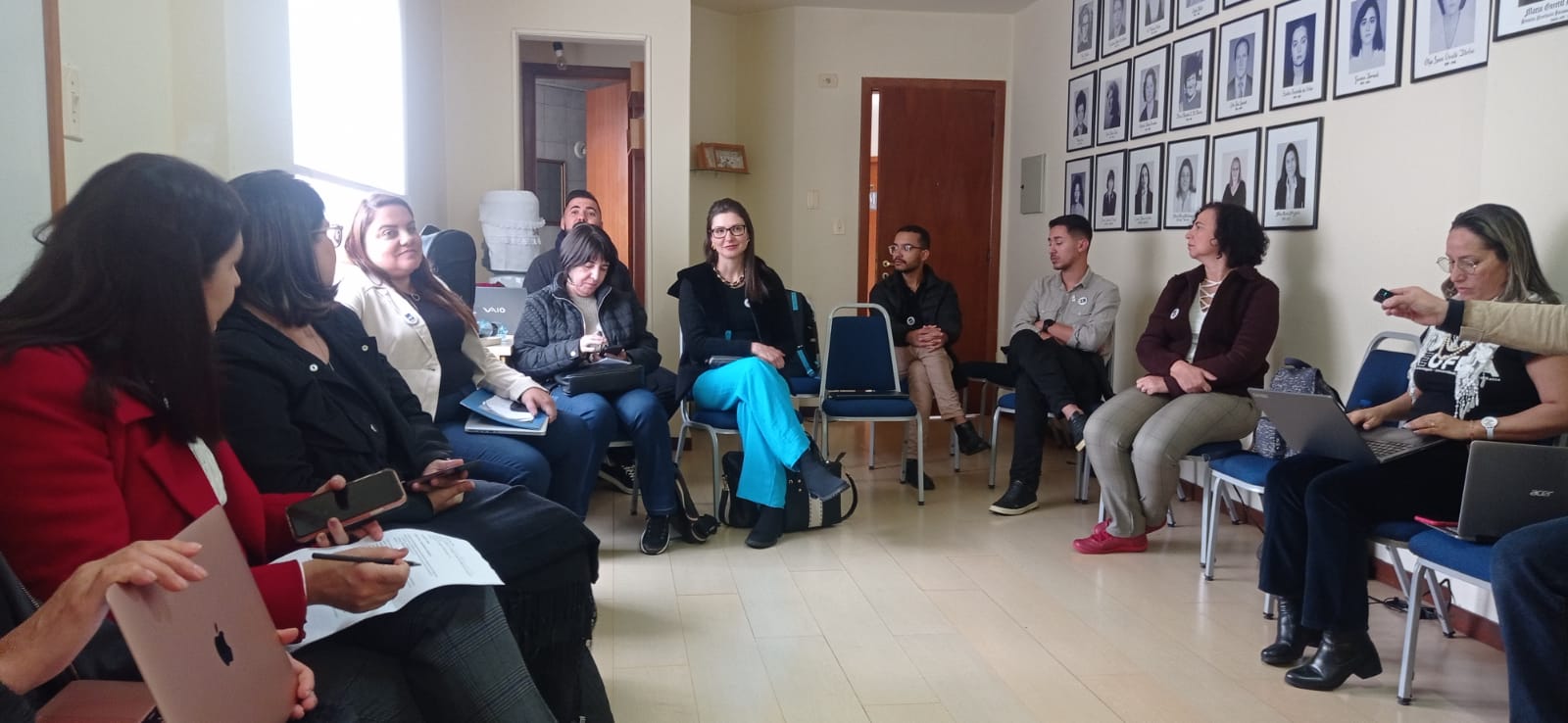On July 17, 2023, the 22nd Ordinary Meeting of the VHL Nursing Brazil Advisory Committee was held at the headquarters of the Brazilian Nursing Association – Paraná Section, in connection with the 22nd National Nursing Research Seminar (SENPE) and the 3rd International Nursing Research Seminar (SINPE). The meeting focused on new perspectives for the Health Sciences and Nursing, with discussions on innovations and ongoing activities in the VHL Nursing Network. Highlights included monitoring the contribution to the LILACS and BDENF databases, as well as projects and working groups such as the quality of the indexing of nursing documents, the development of the area’s terminology and the new thematic areas and Knowledge Windows.
João Paulo Souza, director of BIREME/PAHO/WHO, presented the theme “Using Scientific Evidence for Action in Health”. The presentation included reflections on the new 4.0 technologies, climate change as a new global health challenge and the dissemination of scientific research results for health-related decisions by lay people and communities. In response to these new challenges, the Center’s new strategic plan was also presented, as a proposal for innovation and alignment with the strategic actions of the Pan American Health Organization for Latin America and the Caribbean.

The first panel of the event also included a presentation of the scientific and technical productions in the area by Dr. Sônia Silva Marcon, representative of the Nursing Committee at the National Council for Scientific and Technological Development (CNPq), of the Brazilian Ministry of Science, Technology and Innovation. Next, Dr. Marlise de Oliveira Pimentel Lima, representing the Joanna Briggs Institute – JBI Brazil, presented the institutional cooperation model and publications that have adopted the JBI model for systematic reviews. In closing the first part of the program, Prof. Francisco Lana, coordinator of the VHL Nursing, highlighted the opportunity to launch the Evidence-Based Nursing sub-project, which should provide users with evidence that can be applied to nursing practices at all levels of care.
At the second table, Prof. Francisco Lana presented an analysis of the “Contribution of Nursing Journals to the Achievement of the Sustainable Development Goals (SDGs)”. The most representative themes in nursing journals were the eradication of the AIDS epidemic; universal access to services and universal health coverage; and the prevention and treatment of psychoactive substance use. The presentation also covered the Analysis of Bibliographic Control of the BDENF/LILACS databases and the design of strategies for improving the indexing process and strengthening Brazilian journals, with emphasis on the importance of monitoring contributions by Committee members.
Prof. Francisco also presented an analysis of the process of indexing theses and dissertations in the BDENF/LILACS in the Ibero-American setting and the establishment of strategies to increase the adherence of Postgraduate Nursing Programs, indicating the collaborative status of the network, especially the network in Portugal, which focused its contribution on this type of document.

At the same table, Sueli Mitiko Yano Suga, supervisor of Information Sources and References at BIREME/PAHO/WHO, presented recommendations for good practices in Open Science to be implemented in Nursing journals, especially issues of transparency in the research process and the preparation of journals for machine reading, including the necessary metadata and persistent identifiers in the articles.
Prof. Ana Karina Bezerra Pinheiro, coordinator of the Nursing area at the Brazilian Ministry of Education’s Coordination for the Improvement of Higher Education Personnel (CAPES), brought new perspectives for the development of the subproject in the country, considering her favourable manifestation to encourage Nursing Graduate Programs to index their academic and technical productions in BDENF. New alignments were also discussed to strengthen the TESESENF subproject, which currently has more than 11,000 theses and/or dissertations indexed.
The program also included the launch of the Nursing Descriptors Subproject, which aims to review the terms currently described and work on expanding and adapting them to current times, to give visibility to regional problems and solutions for Nursing Science in an interdisciplinary framework. A Working Group was set up with the following researchers: Ivone Cabral (UFRJ/UERJ), André Moura (UFMG), Virgínia Ramos (UFBA), Cândida Caniçali Primo (UFES), Flavia Giron Camerini (UERJ) and the collaboration of Ana Cristina Spindola Campos and Luciana Rio Branco, both from BIREME/PAHO/WHO.
The construction of new thematic areas and Knowledge Windows for the VHL were discussed and deliberated during the meeting, and the suggestion process was standardized to allow the selection of the theme and working group that will work on the development, validation and publication of those new themes and windows. The thematic areas of “Theoretical, philosophical, conceptual and methodological foundations of nursing care” and “Nursing and Men’s Health”, the Knowledge Window on “Nursing in Disasters and Emergencies” and the strategy for RefNet: “Nursing and Sleep Health” were approved. One of the thematic areas has already been published on the VHL Nursing portal:

According to the coordinator, Francisco Lana, the Committee meeting reaffirms the alignment of the VHL Nursing with the new trends and perspectives being built within BIREME for digital transformation, as well as for the inclusion of health professionals and populations in the scope of its information sources. Also, as a positive outcome of the meeting, the VHL Nursing’s purpose of aligning itself with the 2030 Agenda was highlighted, encouraging journals in the area to participate and develop strategies to achieve the Sustainable Development Goals.

Links of interest:
Recording of the morning session
Recording of the afternoon session
Nursing Virtual Health Library